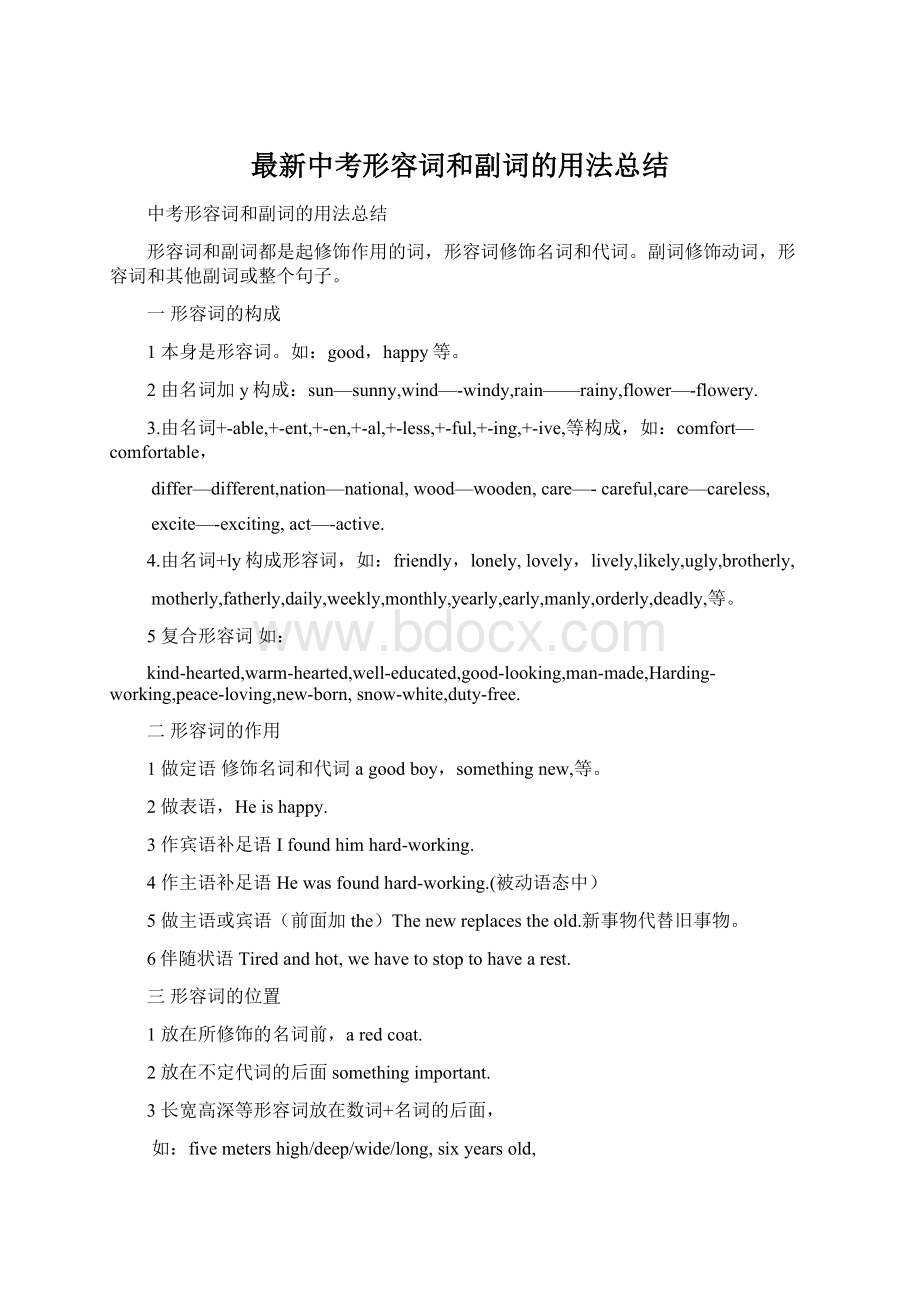最新中考形容词和副词的用法总结.docx
《最新中考形容词和副词的用法总结.docx》由会员分享,可在线阅读,更多相关《最新中考形容词和副词的用法总结.docx(15页珍藏版)》请在冰豆网上搜索。

最新中考形容词和副词的用法总结
中考形容词和副词的用法总结
形容词和副词都是起修饰作用的词,形容词修饰名词和代词。
副词修饰动词,形容词和其他副词或整个句子。
一形容词的构成
1本身是形容词。
如:
good,happy等。
2由名词加y构成:
sun—sunny,wind—-windy,rain——rainy,flower—-flowery.
3.由名词+-able,+-ent,+-en,+-al,+-less,+-ful,+-ing,+-ive,等构成,如:
comfort—comfortable,
differ—different,nation—national,wood—wooden,care—-careful,care—careless,
excite—-exciting,act—-active.
4.由名词+ly构成形容词,如:
friendly,lonely,lovely,lively,likely,ugly,brotherly,
motherly,fatherly,daily,weekly,monthly,yearly,early,manly,orderly,deadly,等。
5复合形容词如:
kind-hearted,warm-hearted,well-educated,good-looking,man-made,Harding-working,peace-loving,new-born,snow-white,duty-free.
二形容词的作用
1做定语修饰名词和代词agoodboy,somethingnew,等。
2做表语,Heishappy.
3作宾语补足语Ifoundhimhard-working.
4作主语补足语Hewasfoundhard-working.(被动语态中)
5做主语或宾语(前面加the)Thenewreplacestheold.新事物代替旧事物。
6伴随状语Tiredandhot,wehavetostoptohavearest.
三形容词的位置
1放在所修饰的名词前,aredcoat.
2放在不定代词的后面somethingimportant.
3长宽高深等形容词放在数词+名词的后面,
如:
fivemetershigh/deep/wide/long,sixyearsold,
4enough放在形容词和副词之后,名词前后均可。
bigenough,enoughtime.
5一些以a-开头的表语形容词不能放在名词前面做定语,要放在名词后做后置定语,如:
amanalive活着的人,aawakebaby一个醒着的婴儿,aasleepbaby一个睡着的婴儿,但是如果这些词本身带有副词修饰时,可以放在名词前面,如afastasleepbaby一个熟睡的婴儿thewideawakesoldier十分清醒的士兵。
6在下列结构中,形容词要放在冠词前,so/how/as/too+adj.+a/an+n.
Itisaspleasantadayasyesterday.Howbeautifulaparkitis
Itistoocoldadaytogoout.Heissocleveraboythatheworksouttheproblem.
只做表语的形容词:
ill,sorry,well,pleased,unable,sure,glad.
几组常见形容词的区别1muchtoo,toomuch2hard,hardly3too,also,either,aswell4already,yet5loud,loudly,aloud6sometime,sometime,sometimes,sometimes7ago,before8just,justnow,now9sosuch10tooenough
副词一副词的分类
1时间副词放在句末,,
2地点副词放句末,地点副词与动词连用时,不加介词,gothere,comehere,
Turnleft,turnright=turntotheright,goeast,gowest,goupstairs,godownstairs,goabroad,
gosomewhere/anywhere/everywhere,......
3程度副词放在所修饰的词前面,enough除外
4频度副词放在be,第一个助动词,情态动词的之后,行为动词之前。
5关系副词连接定语从句when,where,why
6疑问副词构成特殊疑问句when,where,why,how....
7连接副词连接名词性从句(宾语从句,表语从句,主语从句等
when,where,why,how....
注意⚠️方式状语,地点状语,时间状语,按这个顺序
二副词的构成
1本身是副词very,rather等。
2与形容词形式一样hard,early,late,high,wide,deep等。
anearlybus,getupearly
thelatechanges,stayuplate,200metershigh,flyhigh,50feetdeep,
onahardfloor,studyhard
talkdeepintothenight谈到深夜,tenminuteslate晚十分钟,arrivelate,awidestreet,openyourmouth/eyeswide,bewidelyused.
3由形容词+ly构成,slow-slowly,quick-quickly,brave-,bravely,clear-clearly.
4部分以-e结尾的形容词,去e+ly,构成副词。
true-truly,possible-possibly,terrible-terribly,simple-simply,probable-probably.widely
5以辅音字母+y结尾的单词,变副词要把y改成i再加ly,如:
happy-happily。
6本身是副词,加上ly以后意义不同。
latelately,hardhardly,closeclosely,likelikely,deepdeeply,highhighly,widewidely,
goog——well
三副词的作用
1作状语修饰动词rainheavily,修饰形容词原形的词too,rather,very,soquite,修饰其他副词toofast,
修饰介词justbehindthedoor,修饰从句ThisisexactlywhatIneed,修饰其他词almosteveryone,nearly100people,等。
2做后置定语thegirlthere,thepopulationhere.
3作表语,Whoisin?
4作补语Lethimout.
5作介宾fromabroad/here
几组常见副词的用法区别
1muchtoo,toomuch2hardhardly3too,alsoeither,aswell4already,yet5loud,loudly6sometimes,sometimes,sometime,sometime7too,enough8agobefore9just,justnow,now10so,such
形容词和副词的比较级最高级形式
一比较级的构成规则
1规则变化
2不规则变化
二比较级的用法
一)原级比较句型肯定句型A....+as+adj,/adv.+as+B和......一样.....
否定句型A......+not+so/as+adj./adv.+as+B.A不如B.....
降级比较A…+less+adj./adv.+thanB.A不如B......
anyother+单数名词
(all)theother+复数名词
anyoneelse/anythingelse
anyoftheother+复数名词
二)比较级句型
1比较级+than+比较对象
No(other)+单数名词/noone=nobody/none+比较级+than......没有......比…更…。
Nootherwayisbetterthanthisone.
No(other)+单数名词/noone/nobody/none......+as/so+adj./adv.+as+.....
NooceanintheworldisasbigasthePacificOcean.
2the+比较级…,the+比较级…越…,越…。
3比较级+and+比较级,越来越…。
4the+比较级+ofthetwo.....,两者中较为…的一个。
5疑问词+be+比较级,AorB?
两者中最........?
能够修饰比较级的单词much,far,even,still,any,rather,alot,alittle,abit,agreatdeal,
三)最高级句型
1.......the+最高级+可数名词单数+of/in/among......,......中最.......
2......oneofthe+最高级+复数名词+of/in/among......,......最......之一。
3特殊疑问词+be+the+最高级,A,BorC?
三者中最........?
特殊疑问词+行为动词+副词最高级,A,BorC?
Whorunsfastest,Jim,KateorMike
4......the+序数词+最高级+单数可数名词+in(范围)在.....第几最.....
能修饰最高级的词byfar,almost,nearly.....
比较级注意事项
1比较对象必须是对等的即同类事物或人.ItiscolderinBeijingthaninShanghai.
2句中后面的名词避免重复,使用that代替可数名词单数或不可数名词,用those代替可数名词复数,也可以用theone代替单数可数名词。
TheweatherinBeijingiscolderthanthatinShanghai.
Thestudentsinourclassarestrongerthanthoseintheirclass.
Thegirlinredistallerthantheoneingreen.
3比较对象在同一范围内时用other把自身排除掉,不在同一范围内不用other
ShanghaiisbiggerthananyothercityinChina.
ShanghaiisbiggerthananycityinAfrica.
4no+比较级+than两者均否定,译为“一样不”…not+比较级+than,两者均肯定,前者不如后者,译为“…不如…”
Thisproblemisnomoreimportantthanthatone.这个问题和那个问题一样不重要。
Thisproblemisn’tmoreimportantthanthatone.这个问题不如那个问题重要。
5Therearemanymore+复数名词+地点A+than+地点B
Therearemanymorebooksinourschoolthanintheirschool.
Thereismuchmore+不可数名词+地点A+than+地点B
Thereismuchmorewaterintheseathanintheriver.
6than后主格和宾格区别当谓语是be动词,或不及物动词或动词宾语是物时,主格和宾格无区别。
若than后保留动词的话,用主格不能用宾格。
Sheistallerthanhe/him.ShespeaksEnglishbetterthanhe/him.
TomrunsfasterthanIdo(不能用me);
ShespeaksEnglishbetterthanhedoes.
当谓语动词是及物动词时,意义则不同,
如:
Iknowsyoubetterthanhe(knowsyou).此句是主语相比较,我比他更了解你
Ilikeyoubetterthan(Iknow)him.和他相比,我更了解你(我了解你胜过了解他。
)
than是you时,助动词就不能省略了。
Sheknowsmebetterthanyoudo.
7amostinterestingstory十分有趣的故事,themostinterestingstory最有趣的故事
四)倍数的表达
1A+be(或行为动词)+倍数+as+adj./adv.+as+B。
A是B的………倍
Thisroomisthreetimesasbigasthatone
2A+be(或行为动词)+倍数+比较级+than+B。
A比B……倍。
Thisroomisthreetimesbiggerthanthatone.
3A+be+倍数+thesize(length,width,height,depth,weight...)+ofB.
A是B的……倍。
Thisroomisthreetimesthesizeofthatone.
4A+be(行为动词)+as+many+复数名词(much+不可数名词)+as+B
Weseeasmanybooksaswecan.weeatasmuchfoodaswecan.
Wehaveasmanybooksasthem.
一、英语阅读理解专项练习试卷
1.阅读理解
Accordingtoa2018studyfromSanFranciscoStateUniversity,nearly2.4billionpeoplearoundtheworldusedasmartphonein2017.Bytheendof2019,morethanathirdoftheglobalpopulationwillbeusingasmartphone.
However,smartphonetechnologycanbeadouble-edgedsword.Ontheonehand,itsendsusunlimitedamountsofinformation.Ontheotherhand,usingasmartphonemaybecomeanaddiction.
ErikPeperandRichardHarveyarebothhealtheducationprofessorsatSanFranciscoStateuniversity.Theyledthestudy.Peperexplainsthatsmartphoneaddictionformsconnectionsinthebrainthataresimilartodrugaddiction.
Andtheseconnectionsformslowlyovertime.Also,addictiontosocialmediamayaffectouremotionalstate.Thetwoprofessorsasked135universitystudentsabouttheirhabitofsmartphoneuseandtheirfeelings.Theyfoundthatstudentswhousedtheirphonesthemostreportedhigherlevelsoffeelinglonely,depressedandanxious.
PeperandHarveydonotblameusersfortheirtechnologyaddiction.Theybelieveitisthetechindustry'sdesiretomakemoremoneythatistoblameforthetechnologyaddiction.Theresearcherswarmthatworkersinthetechnologyindustryknowhowtocontrolourbrainsandturnusintoaddicts.
Buttheresearcherssaythatwecanlimitourbrainstobelessaddictedtoourphonesandcomputers.EnkPepersuggeststimingoffourphonesbeforewesleepordosomethingimportant.Theresearchersalsosuggesttakingcontrolofwhenandwhereyouanswertextsoremails.Youdonotneedtoanswerthemall.Andyoucertainlydon'tneedtoanswerthemassoonasyougetthem.Theyalsosuggestputtinglimitsonthetimeyouspendonsocialmedia.IfyouwanttocatchupwithfriendsonFacebook,setasideasmallamountoftimetoit.Youshouldfocusonimportanttasksanddonotallowtechnologytodisturbyou.
(1)WhatcanweinferfromParagraph1?
A. Smartphoneusehasbecomeextremelycommon.
B. Mostyoungpeoplecan'tlivewithoutsmartphones.
C. Smartphonesmakeourlifemorecolorfulandconvenient.
D. Mostpeopleconsidersmartphonesasthegreatestinvention.
(2)TheunderlinedsentenceinParagraph2meanssmartphonetechnology____.
A. hasabrilliantfuture
B. canbebetterthanmostpeoplethink
C. hasbothadvantagesanddisadvantages
D. cangiveusunlimitedamountsofinformation
(3)WhatdidEnkPeperandRichardHarveyfindaboutsmartphoneuse?
A. Itcanhelpreduceloneliness.
B. It'smorepopularwithstudents.
C. It'spreferredbyyoungpeoplefeelinglonely.
D. Itcanharmstudents'emotionalstateinmanyways.
(4)Whatdoesthelastparagraphmainlywanttotellus?
A. Socialmediaisn'tthatimportanttous.
B. Wecantrainourbrinetodomanythings.
C. Weshouldn'tbecomeaddictedtooursmartphones.
D. TherearewaystodealwithSmartphoneuseaddiction.
(5)WhichofthefollowingsisTrue?
A. Wecanusesmartphonestodealwithloneliness.
B. Anaddictioncan'tbecontrolledifwestillusesmartphones.
C. Therewerenearly2.4billionpeopleusingsmartphonesintheworldin2017.
D. Stopusingsmartphonesifyoudon'tknowwhenandwhereyoushouldanswertheemails.
【答案】
(1)A
(2)C
(3)D
(4)D
(5)C
【解析】【分析】【文章大意】本文讲述了智能手机的利与弊。
一方面,它向我们发送无限的信息。
另一方面,使用智能手机可能会成为一种瘾。
(1)判断推理题。
根据nearly2.4billionpeoplearoundtheworldusedasmartphonein2017Bytheendof2019morethanathirdoftheglobalpopulationwillbeusingasmartphone.201,全球近24亿人使用智能手机。
到2019年底,全球超过三分之一的人口将使用智能手机。
可知,智能手机的使用已经变得非常普遍。
故选A。
(2)句意猜测题。
根据后一句Ontheonehanditsendsusunlimitedamountsofinformation.Ontheotherhandusingasmartphonemaybecomeanaddicti